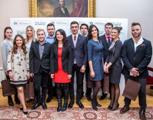UNDEF was established by the UN Secretary-General in 2005 as a United Nations General Trust Fund to support democratization efforts around the world. UNDEF supports projects that strengthen the voice of civil society, promote human rights, and encourage the participation of all groups in democratic processes. The large majority of UNDEF funds go to local civil society organizations -- both in the transition and consolidation phases of democratization. In this way, UNDEF plays a novel and unique role in complementing the UN's traditional work -- the work with Governments -- to strengthen democratic governance around the world. UNDEF subsists entirely on voluntary contributions from Governments; in 2010, it surpassed 110 million dollars in contributions and now counts 39 countries as donors, including many middle- and low-income States in Africa, Asia and Latin America.
In four Rounds of Funding so far, UNDEF has supported a total of more than 330 projects in more than 110 countries.
UNDEF projects are two years long and fall under one or more of six main areas:
- Community development
- Rule of law and human rights
- Tools for democratization
- Women
- Youth
- Media
UNDEF grants range from US$50,000 to US$500,000. Applications are subject to a highly rigorous and competitive selection process, as UNDEF receives an average of about 2,000 applications a year and only some 60-70 are selected.
UNDEF was one of only two UN entities mentioned by President Barack Obama in his speech to the UN General Assembly on 23 September 2010. Declaring that "it’s time for every Member State... to increase the UN Democracy Fund", President Obama spoke of democracy as the form of government that delivers most for citizens, and described civil society -- the focus of UNDEF's work -- as the shapers of human progress and the conscience of communities.











































































































































































































































































































































































































































































































































































































































